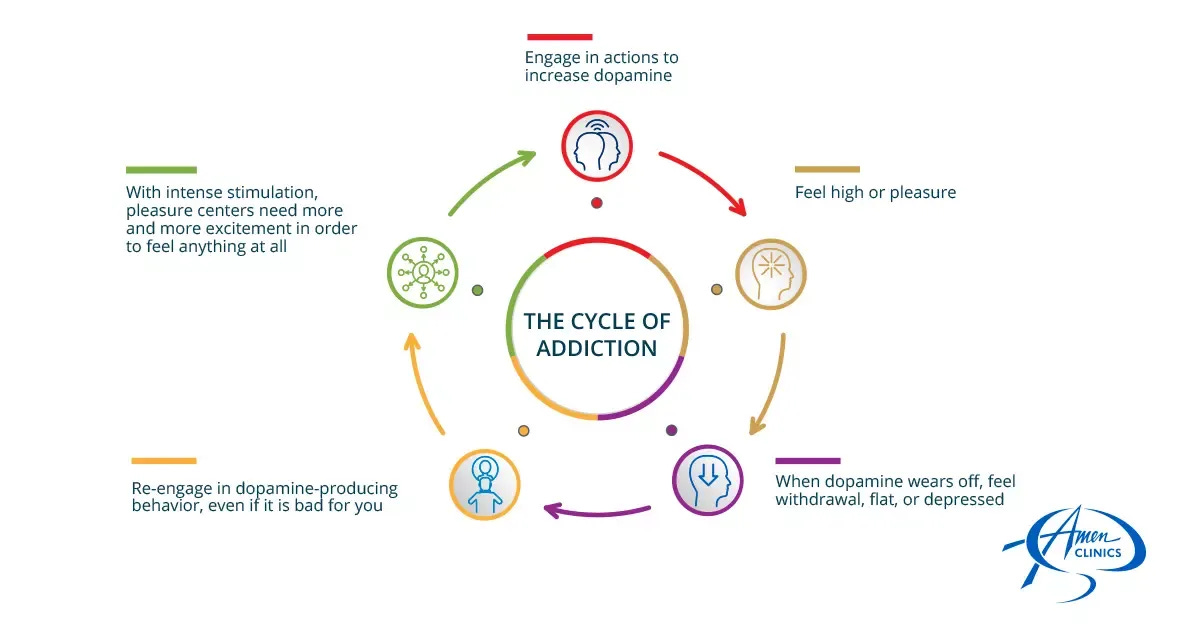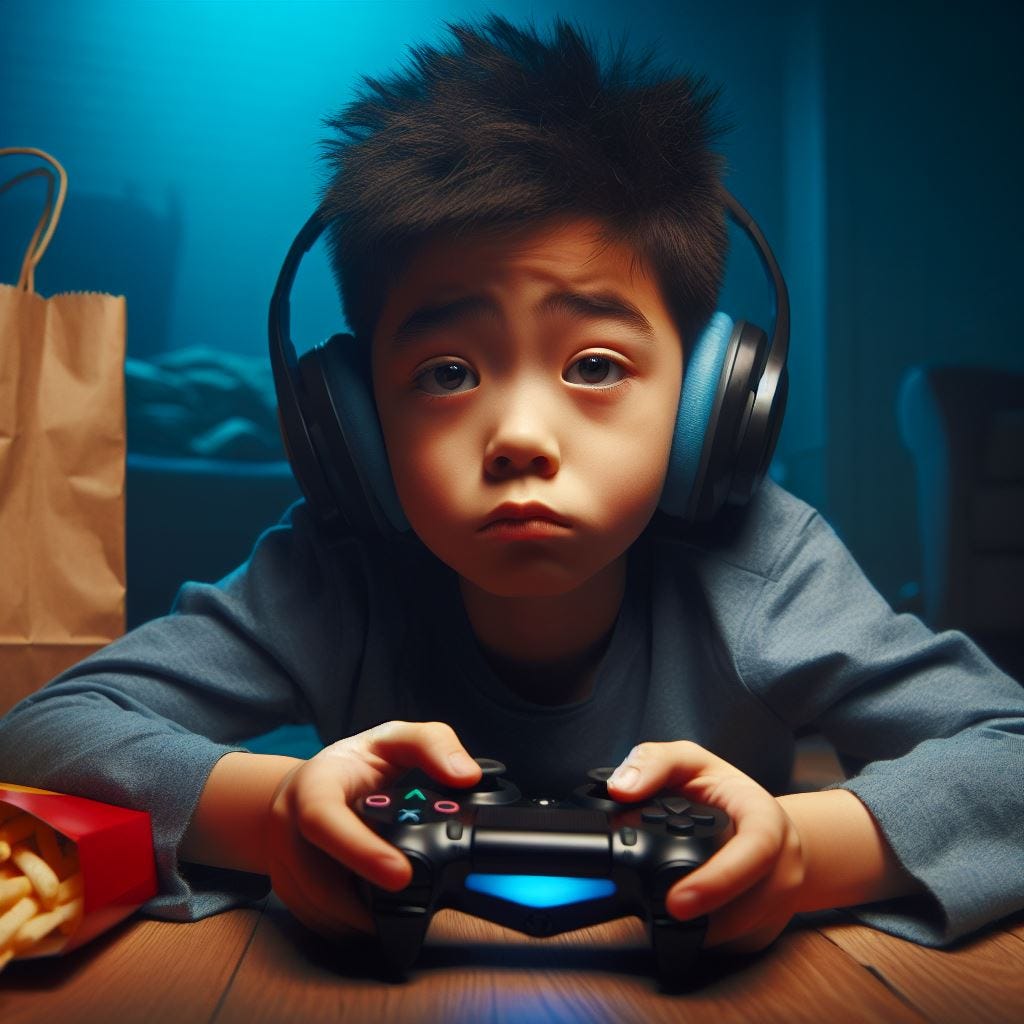Don't hate the player, hate the gaming industry
The pros and cons of gaming and the consequences of childhood addiction.

The gaming industry is one of the main players when it comes to the dopamine industrial complex, where entire research and development budgets are focused on how to hoover up as much of our attention as possible.
Society has become so tolerant of children having their imagination intravenously injected that we deny them the opportunity to be bored, and learn to tolerate boredom. Without this, creativity struggles to emerge and children are less likely to conjure up their own adventures and build barracks made of old boxes.
Video games, as well as those on phones and iPads, have made the psychological reward systems humans evolved to chase challenge, status, accomplishment, and excitement, armchair accessible without the need to experience real-world consequences.
Healthy gaming
The problem is not gaming per se, it’s the amount of time spent gaming, compared to real-life experiences, especially while children’s brains are developing. Moderation is key and even though growing up we had a few hours on the PlayStation, the gaps in-between Mario Kart weren’t filled with iPhones and iPads. Instead, we played sports, hung out in the park, climbed trees, and socialised in real-life, something disappearing rapidly from childhood. Some healthy habits to consider are:
Time-limits: Designing a pre-agreed schedule, that determines appropriate times of the day to play and maximum durations.
Content moderation: Be aware of games and content children are exploring, and educate them about potential dangers online.
Education: Keep an open discussion with children about the downsides of excessive gaming, and an awareness of symptoms of addiction.
Lead by example: If parents reduce their own screen-time, it sets a positive precedent and makes them more available for interactions with their child.
Let them earn it: Self-discipline and positive behaviour can be reinforced by using game time as a reward.
Detoxing: Have a family detox from gaming and devices for a set period of time. Start easy and build it up. Make it a fun challenge with rewards.
Consistent consequences: Stick to pre-determined rewards for earning gaming time and sanctions for breaking the rules. Consistency is key.
The benefits of gaming

Call of Duty and FIFA have consumed more hours of my life than I’d dare count. However, there were many benefits, especially social, as you are usually playing with friends, and quite possibly being kept out of trouble. Benefits of video games include:
Cognitive exercises: allows for strategic thinking, hyper focus, decision-making, and problem-solving.
Building resilience: supports the overcoming of failure and challenges and the development of a mindset of determination and perseverance.
Improved well-being: allows for stress relief, escapism and unwinding.
Social opportunities: facilitates spending time with friends, online and in-person, in cooperative team games.
The consequences of excessive gaming
“Changes that occur in video game addicts are similar to those that occur in other addictions, such as substance-related addiction and gambling. Video game addiction can lead to many serious consequences for gamers and the people close to them” - National Library of Medicine
Gaming addiction is now officially in the Diagnostic and Statistical Manual of Mental Disorders (DSM-5) due to the growing concern about its significant cognitive and behavioural symptoms. Rehabilitation centres are popping up worldwide.
Excessive gaming leads to:
Chemical overload: Hyper-stimulating graphics, appropriately challenging gameplay and the precise use of soundtracks, produces sustained and elevated levels of cortisol, dopamine, and noradrenaline.
Motivation: High levels of easily accessed dopamine triggered by gaming reduces motivation for real-life equivalents.
Behavioural changes: Gaming can lead to withdrawal which impacts a child’s ability to focus on other tasks, their quality of sleep and levels of irritability when unable to play.
Inadequate exercise: Gaming for long periods isn’t good for cardiovascular, musculature and postural health and can lead to repetitive strain injuries.
Social disconnection: Social and emotional skills are learned from real-life consequences of behaviour, a lot of which is missed, or reinforced differently, when behind a screen.
Mental health: Lack of exercise, neurochemical spikes and a reduction in face-to-face socialisation all affect children’s well-being.
Emotional maturity: Whether it’s fighting or football, actions without the real-world consequences of physical or social feedback gives children a skewed understanding of appropriate behaviour.
Status seeking: If children are successful at climbing the virtual social ladder, they will be more motivated to continue online at the expense of the real world, especially if the opposite is true there.
The power of parental perspectives
“My Dad grew up racing the back roads of the Irish countryside, but lasted one game of Colin McCrae rally, even after buying the racing wheel and pedals. Now, he can sit for hours pushing pennies at a virtual arcade.”
Changes in parental attitudes towards gaming have had a significant impact on it prevalence in children. Compared to previous generations, today there is less control on time limits, less judgement around its use and more openness to children exploring gaming as a career. Not only did a generation of gamers grow up and have kids, but due to the bottomless supply, there is now a game for everyone, which removes previous barriers to entry. It’s much harder to recognise the negatives of excessive gaming if our own judgement is clouded by its fabulously effective dopamine feedback loop.





Thanks for restacking @An K.! Appreciate it
Very interesting article. Thank you!!
A couple of years ago we had a family with three children (ages 5, 11 and 13) as tenants. The kids were 'self-regulating home schoolers' (meaning all three of them were in front of screens all day every day and late into the night too, if they so chose). The youngest basically saw the whole world as a video game and talked about his upcoming birthday as "going to level 6". The father is a games developer, the mother a physicist. Both parents were convinced that this approach would give their children the opportunity to become 'smarter'.
I'm also intrigued about what you write on boredom. Some time ago I read (can't remember where) that boredom is a form of overwhelm. Totally agree with you. Kids need time and resources to develop their creativity and engage in the 'real world'.
When my grandson comes to visit and tells me he is bored, my first response is usually, "oh how interesting! What does boredom feel like? I've never had it, so I don't know..." Initially he gets pissed off, but then I take him for a little walk (for example) and we look for animal poo to see if we can identify the animal, and invent names for the droppings.
Thank you for your work!